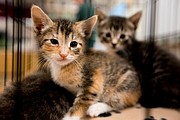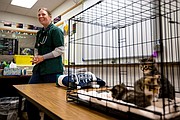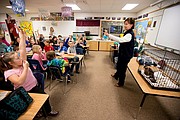When science and cute collide
COEUR d'ALENE — Third-graders at Ramsey Magnet School of Science Wednesday got a hands-on look at how science and cuteness can collide to create a career.
During their lunch period, students ate in the school's science lab and were joined by Vicky Nelson, director of development at Kootenai Humane Society; Nichole Leonard, a veterinarian; and three fluffy felines. The event was one of three annual "Junior Science Cafe" meetings at the school, which are organized by the student council as a way to expose kids to science-based careers.
Principal Crystal Kubista told The Press the students brainstorm professions they are interested in and provide administrators with a list of popular choices. During three lunch periods a year, one grade level gets to eat lunch in the science lab and hear from a professional.
Kubista added the Science Cafe is optional, and the students have to sign up if they want to participate.
"The group that wants to be here and participate is here," Kubista said. "That's why they're so excited."
After speaking to the children about her background and education, Leonard asked the students if any of them were interested in pursuing veterinary medicine. More than half of the students excitedly raised their hands.
"Then you better be into science, because I had to do a lot of it in school," Leonard said with a smile.
When asked by one of the students why she became a vet, Leonard said she has had a passion for animals since she was a child. Before completely committing to the field, Leonard said she shadowed a veterinarian and quickly realized she was cut out for the work.
"It's not all about petting dogs and cats," she added. "You have to give them shots and treatments they don't really like, too."
Leonard fielded several other questions from students, including one about what spaying means and one that had Leonard give the age of the oldest cat she has ever worked on, which was 23. One of the final questions was from a student who wondered what exactly it takes to become a veterinarian.
"You have to apply yourself and do the best you can. My K-12 education made it a lot easier because I was prepared when I got to college," Leonard said. "And in college you have to make sure you're applying yourself and doing your best as well because it's a very competitive field."
Nelson fielded several questions about the animals the humane society cares for, as well as some enthusiastic testimonials from students who have adopted pets. She also encouraged the kids to tell a teacher or their parents if they come across a stray animal, instead of approaching it.
After the allotted time for questions concluded, each of the third-graders had the opportunity to pet the 4-week-old kittens brought in from the humane society. Kids eagerly huddled around Leonard and Nelson while they handled the kittens, waiting for their chance to pet a cat before heading back to class.
"They're so fluffy," one student exclaimed.
"And their heads are so soft," another student excitedly added.
Kubista told The Press having the the Junior Science Cafe events was beneficial to students at Ramsey because it gets them thinking about their futures.
"It's hard for them to think down the road sometimes and understand why they're learning what they're learning in science, and why it's important for their futures to learn it," Kubista said. "We want to provide them with opportunities to see what science can do for them."







